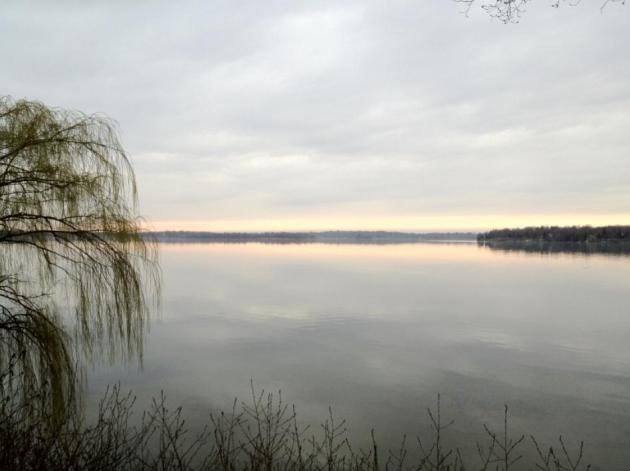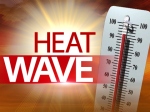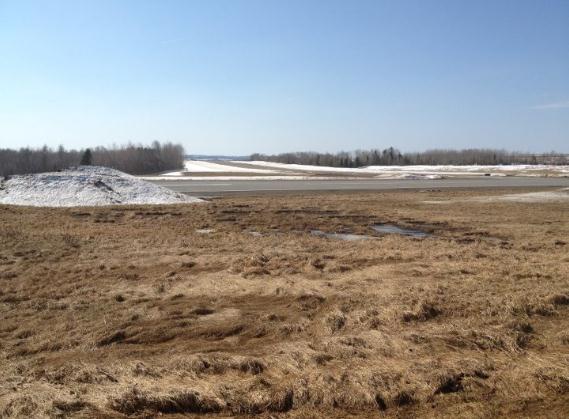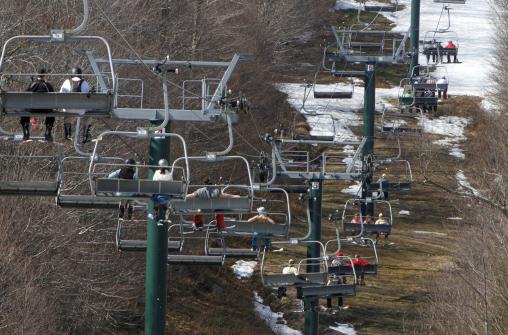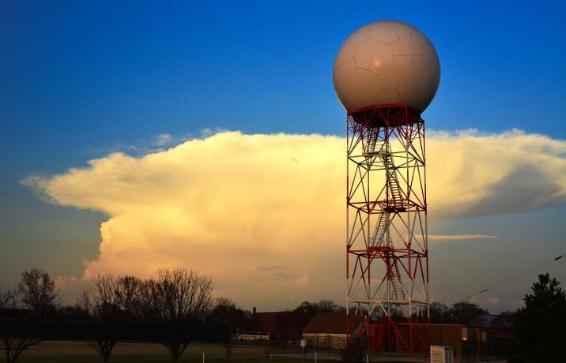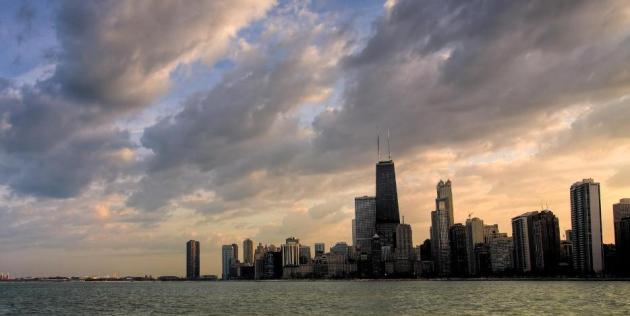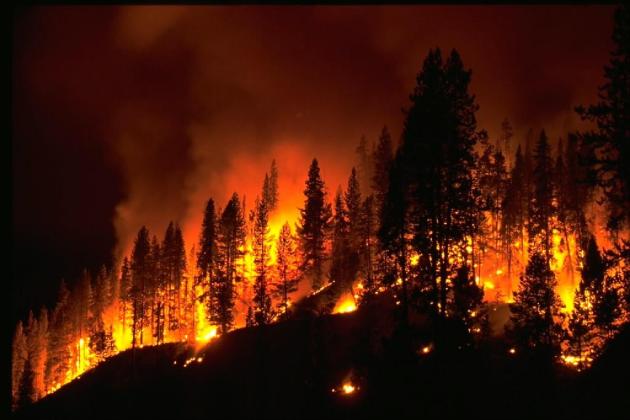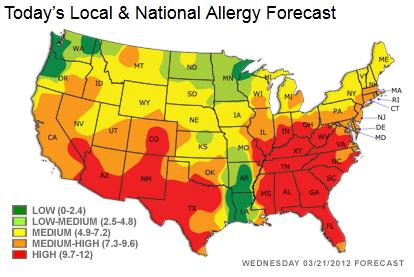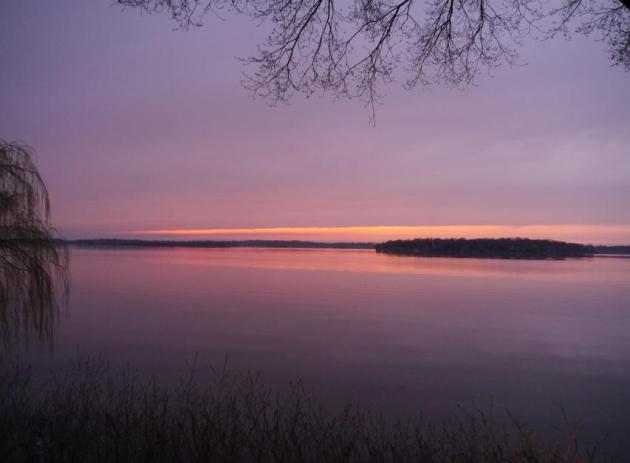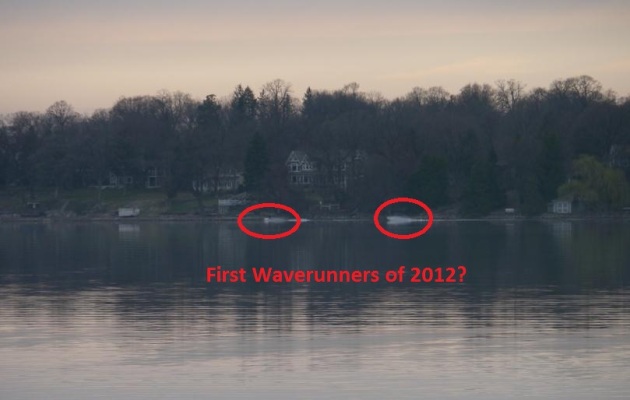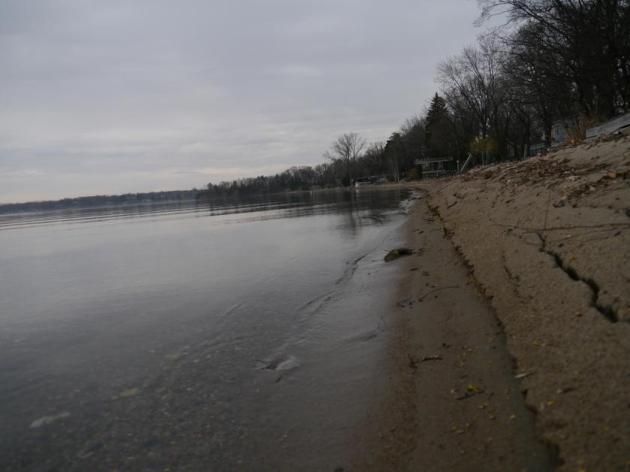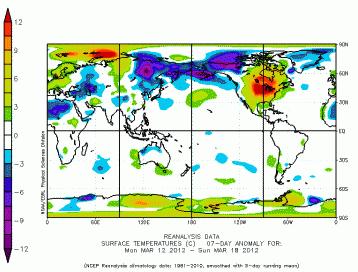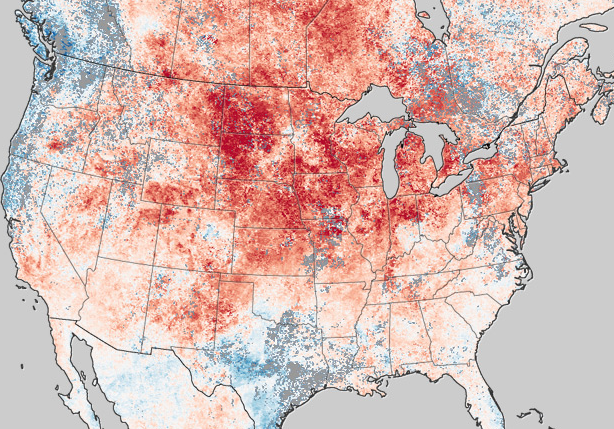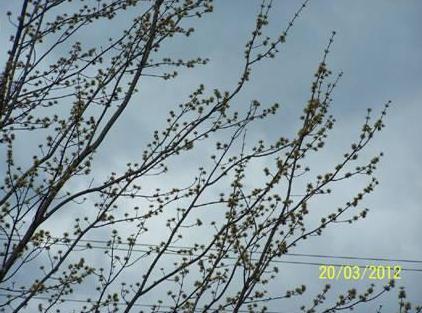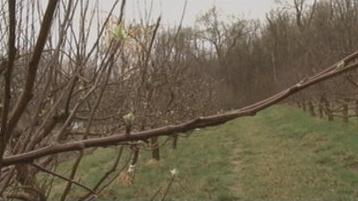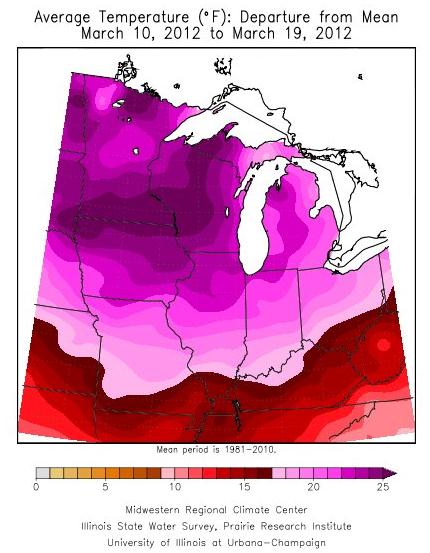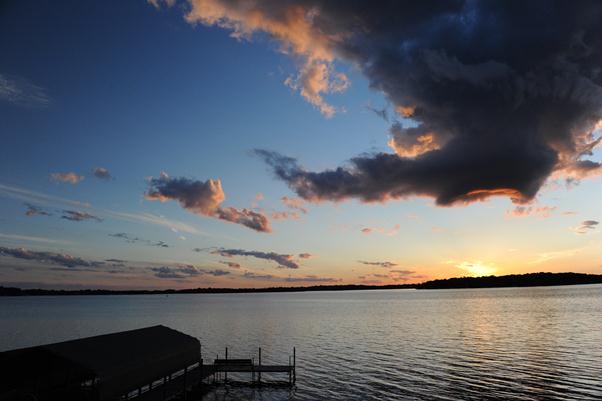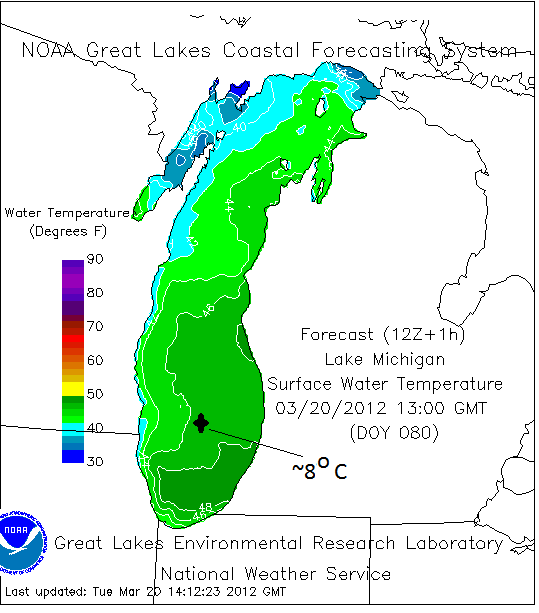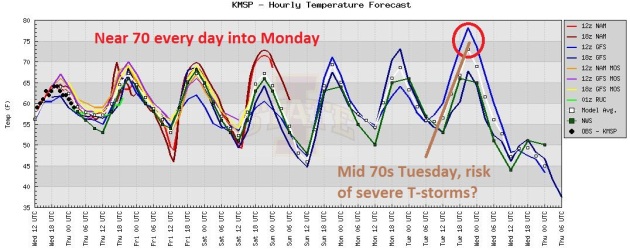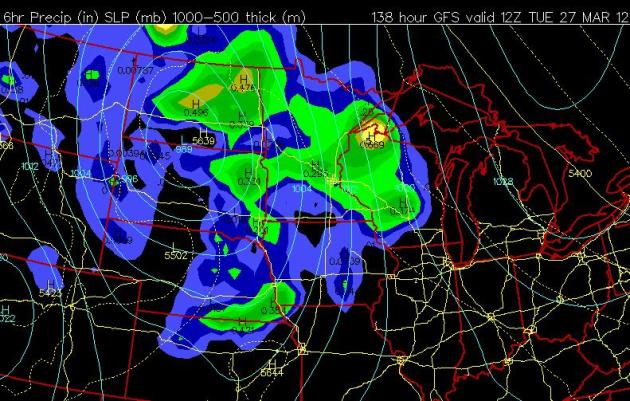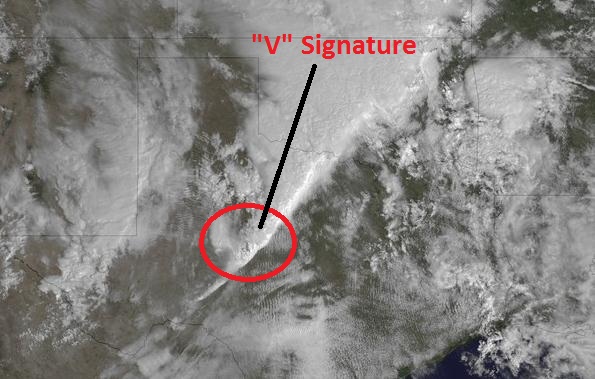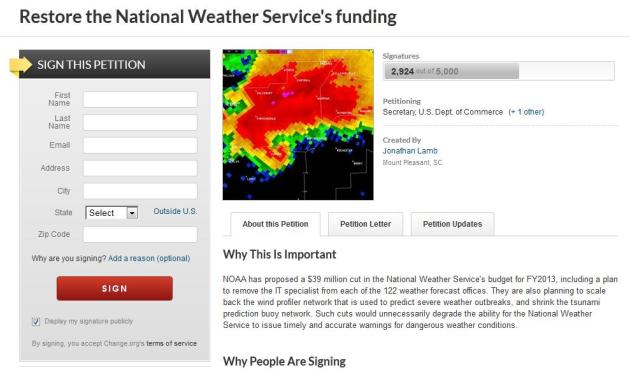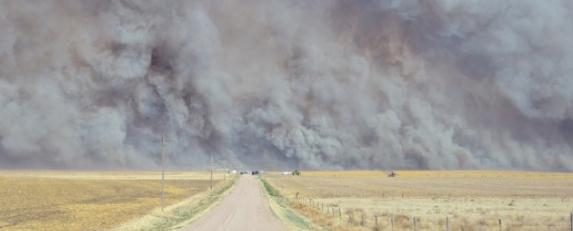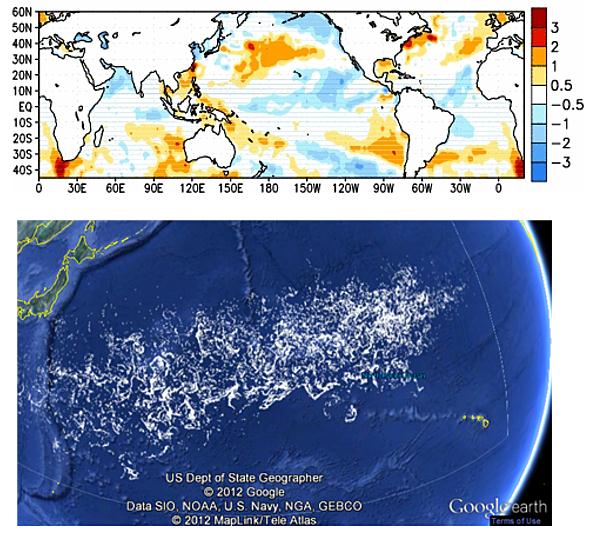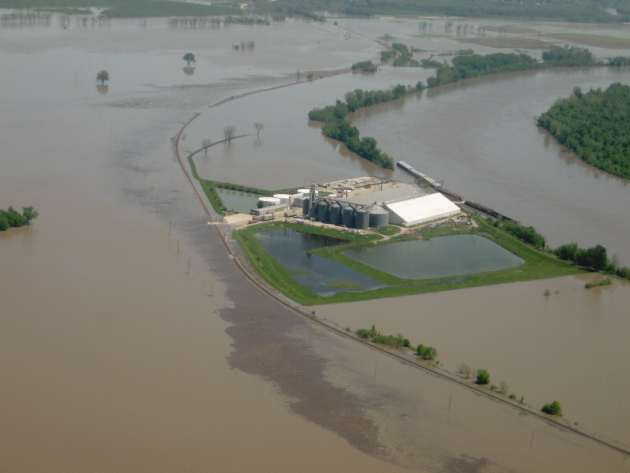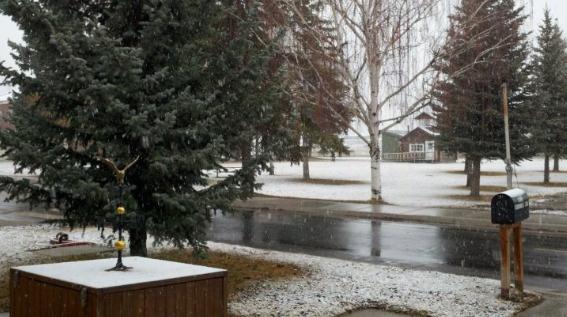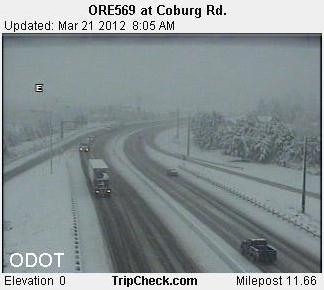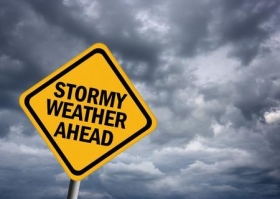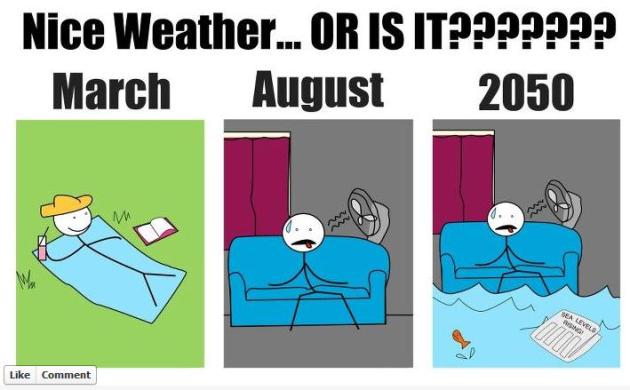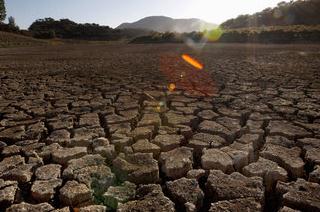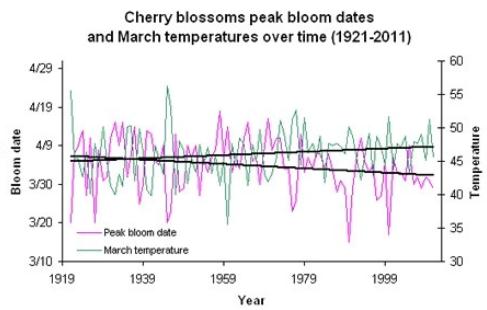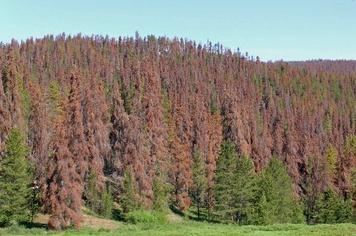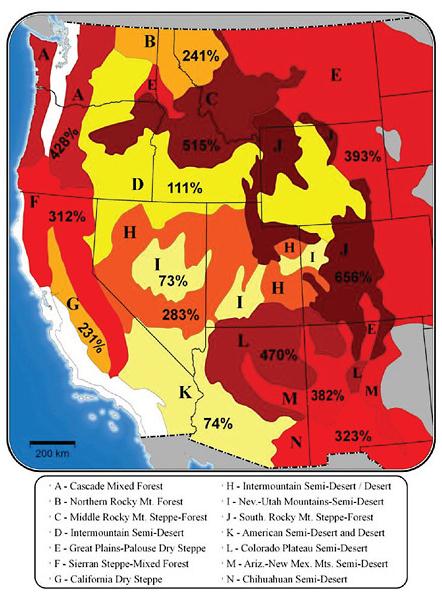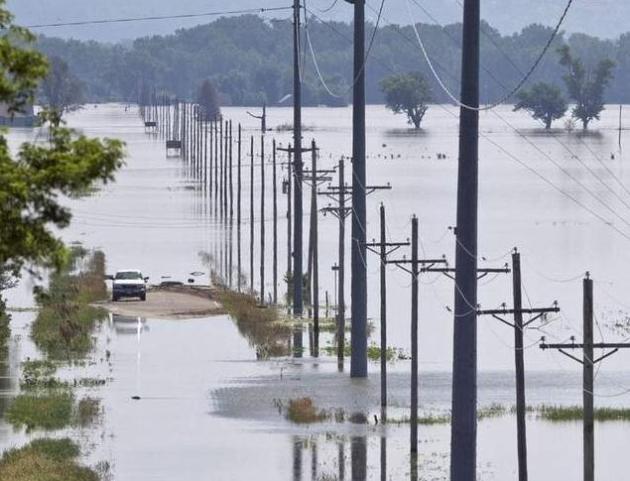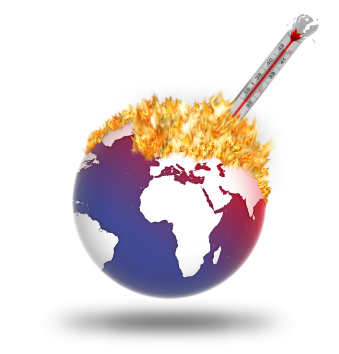3rd earliest ice-out on Lake Minnetonka since 1855. Technically, it was a tie for the #3 spot. Details below.
Lake Minnetonka Officially Ice-Free. From
The Star Tribune: "
Lake Minnetonka officially went ice-free Tuesday morning, a major sign of spring for the metro area and yet another unusually early one. The Hennepin County Sheriff's Office declared the lake clear at 5 a.m. On Monday, White Bear Lake, on the opposite side of the metro area, also was declared ice-free. The Freshwater Society, which has monitored ice conditions for many years on Lake Minnetonka, had not made an ice-out call by midafternoon Tuesday. The earliest ice-out date on Minnetonka in the society's records is March 11, 1878. The second-earliest was March 18, 2000."
87 F. Chicago, Illinois. 8th consecutive day of record-setting temperatures in the Windy City.
87 F. Saginaw, Michigan. That's only 2 degrees cooler than the all-time monthly record for
April at Saginaw!
86 F. at Dayton, Ohio, breaking the old record set in 1918.
85 F. at Columbus, Ohio, a new record for March 21.
84 F. at Milwaukee, Wisconsin Wednesday, the warmest March day on record.
84 F. Rockford, Illinois.
84 F at Indianapolis, Indiana, breaking the old record of 82 F. in 1907.
84 F. at Detroit, Michigan, a new record.
83 F. at Madison, Wisconsin, warmest March day on record.
*81 F. at Marquette, Michigan, breaking the old record high of 49. First time Marquette has seen 80 F. in March.
82 F. at Green Bay, Wisconsin. Tie for the warmest March temperature on record.
8 consecutive days above 70 at Cleveland, an all-time record.
81 F. At Marquette, Michigan Wednesday - Warmest Ever In March. From the Marquette, Michigan office of the National Weather Service via
Facebook: "
81? We'll Take IT! First time in March EVER reaching 81 at this office (Records back to 1961)!!!"
Almost Snow-Free At Caribou. There's an awful lot of bright-brown up at Caribou, in the northern tip of Maine. Here's more from the
Caribou NWS office: "
Here’s what it looks like right outside our door at the Caribou Forecast Office, looking over at the airport, with mid-summer warmth with temperatures in the mid 70s. Not a lot of snow left on the ground! Just last Thursday we were on the heels of getting a foot of new snow with a total of 2-3 feet on the ground. Now look at us! There are some flowers beginning to pop out of the ground. What sort of “greening up” are you seeing? How early does the greening up seem to be compared to years past?"
Where's The Snow? Photo credit: "
In this March 20, 2012 photo, skiers ride a lift over thinly-covered slopes at the Sugarbush Resort in Fayston, Vt. Northern New England is experiencing some summerlike weather. Forecasters say the temperature should go past 70 degrees on Wednesday in Portland, Maine, smashing the old record by 10 degrees or more. And it'll be even warmer Thursday, moving toward the 80-degree mark.(AP Photo/Toby Talbot)."
“
There’s extremes in weather, but seeing something like this is impressive and unprecedented,” Chicago NWS meteorologist Richard Castro said. Full story below. Photo: Chicago NWS office.
"
Chicago, for example, saw temperatures above 80 degrees every day between March 14 and 18, breaking records on all five days. For context, the National Weather Service noted that Chicago typically averages only one day in the eighties each in April. And only once in 140 years of weather observations has April produced as many 80 degree days as this March." - NASA post. Details below.
"
In the spring, at the end of the day, you should smell like dirt." - Margaret Atwood
986 wildfires in Florida have burned more than 16,000 acres since Jan. 1. [
Palatka Daily] It's going to be a long, hot (potentially fiery) summer season across the USA. Photo: NOAA.
30 million acres of forestland impacted by bark beetles; an estimated
6 billion trees killed across western USA and British Columbia since 1997. Dead trees emit more carbon into the atmosphere. Source: Live Science. Details below.
Premature Tick Alert. A number of my friend's dogs have already become infected with ticks. I know - this is coming about 5 weeks ahead of schedule. Might want to check your favorite pooch (or cat), just to be safe. Photo:
pets.webmd.com.
Record pollen counts across the southeastern USA. Source: CNN.
Off The Scale. This early surge of warmth and humidity (and sudden, historic spike in plant growth) has resulted in "high" levels of pollen from the Ohio Valley into the southeastern USA, as well as the southwestern U.S. Plug in your zip code and get a personalized pollen count for your area, courtesy of
pollen.com.
Lake Minnetonka Open For (Boat) Business. An update from the Freshwater Society, which has a different metric for determining "ice-out" than the Hennepin County Sherrif's Office. More from
lakeminnetonka.patch.com: "
The ice is out on Lake Minnetonka. The Freshwater Society, which has declared when the ice officially is out since the 1960s, made the call at 9:12 a.m. on Wednesday, March 21. This year’s ice-out is 24 days earlier than last year and is tied for the third-earliest ice-out in records going back to 1855. Last year’s ice-out came on April 14, the median date for ice-out. The Hennepin County Sheriff’s Water Patrol uses a different standard: When it is possible to go by boat from the Patrol’s headquarters in Spring Park through the Narrows and around Big Island without having to significantly alter course because of ice. The Water Patrol declared the ice out at 5 a.m. on Tuesday, March 20."
First Waverunners Of 2012? I was surprised to see a couple of adventurous Minnesotans (no wet suits) zipping around the lake on waverunners Wednesday evening on Lake Minnetonka. Waverunners on March 21? Huh?
Lakeshore - or Levee? Water levels on Lake Minnetonka are down at least 3 feet, maybe more. Now that the ice is off your favorite lake, the big question is: how many extra sections of dock are you going to need this summer to reach deep water? A good summer to be in the dock business, or propeller repair.
It's A Broken Record Of Record-Breaking Heat. Andrew Freedman has the story at
Climate Central: "
Another day, another slew of temperature records set, as the extraordinary March heat wave shows no signs of completely abating. Along with the record warmth, Monday brought a line of severe thunderstorms that stretched in a line from the Texas-Mexico border to the U.S.-Canadian border in Minnesota. Thunderstorm wind damage was reported near Minneapolis, a city more accustomed to March snowstorms than thunderstorms. The presence of warm, humid air so far north was extremely unusual for this time of year, but then again, so is nearly everything else about this heat wave. In fact, the broad geographic scope of this heat event, along with the margins by which records are being broken, the time of year this is occurring, and the duration of the event are all indications that this may be an unprecedented event since modern U.S. weather records began in the late 19th century."
Graphic credit above: "
Surface temperature anomalies for March 12-18, showing the warmth over North America in bright orange/red colors. Click on the image for a larger version. Credit: NOAA/ESRL."
NASA Image Shows U.S. Heat Wave That Turned Winter Into Summer. The story from Grand Rapid's
mlive.com: "
When it comes to record-shattering March heat, a picture really is worth a thousand words. NASA’s Earth Observatory released an image of North America illustrating the extent of this heat wave, which has turned winter into summer for 1,054 locations that experienced record high temperatures between March 13 and 19 across the U.S. and Canada. Another 627 locales broke records for warmest daily lows, according to Hamweather. The NASA post noted that weather records are not only being broken across the country, but "they're being broken in unusual ways."
"Chicago, for example, saw temperatures above 80 degrees every day between March 14 and 18, breaking records on all five days. For context, the National Weather Service noted that Chicago typically averages only one day in the eighties each in April. And only once in 140 years of weather observations has April produced as many 80 degree days as this March."
Budding Trees In Marquette, Michigan - Already? From the
Marquette office of the National Weather Service: "
This picture was sent to us by the Emergency Management Coordinator in Ontonagon, MI showing the buds on his maple tree on March 20th. Absolutely amazing. Our average last freeze date isn't until late May."
Apple-Eater? Heat Wave Could Wipe Out Apple Crop. More details from Sioux Fall's
kpth.com: "
MONDAMIN, IA - It didn't look like it Tuesday, but here in Siouxland we've had more than our fair share of warm, sunny weather this winter and the beginning of spring. While we're all enjoying the sunshine one local farmer says this warm weather could be devastating for his crop. That heat's causing local apple trees and other fruits and plants to start blossoming earlier than normal. "It's going to be a challenging year; I can see that right now," says Jim Small, President of Small's Fruit Farm, Inc., just east of Mondamin, Iowa. At Small's Fruit Farm you'll find a little bit of everything from strawberries to apples. Because of warm weather those apple trees are already in bloom, and they're a full month early. "
What Happened To "Normal"? From the
Wilmington, Ohio office of the National Weather Service: "
A zoomed in version of the photo in the previous post- courtesy Midwest Regional Climate Center - valid March 10 - March 19 2012. Dark purple hues indicate average temperatures approaching 25 degrees above normal!"
Too Early To Put Your Dock In? Why not. Here are some links from meteorologist Rob Koch:
Rob adds, "4 owners across the lake from us (Scandia) have dock and lifts in. Last year they put them in April 1."
Lake Michigan: Historic Warmth. "It appears that the current water temperatures are higher than any observed previously from 1981 to 2008 during the month of March. Lake Michigan sea surface temperatures have responded to the record warmth of the past week to warm into the low to mid 40s over the nearshore waters from Sheboygan to Kenosha out to mid-lake. The above image shows mid-lake temperatures in the mid 40s, which corresponds nicely with the above graphical depiction from NOAA-GLERL.
The graphic also suggests that the current water temperatures in South Lake Michigan are also similar to what is normally seen in late May and early June.
Cold-Free March Goes On. Models show highs in the mid 60s today, but near 70 every day from Friday thru Monday, maybe mid-70s Tuesday, with a risk of severe T-storms.
Tuesday Severe Outbreak? With the premature surge of historic heat (and humidity) comes an elevated risk of strong to severe storms. I'm most concerned about next Tuesday, as a very intense storm tracks north/west of MSP, placing the Twin Cities in the "warm sector". Southeast winds at the surface, southwest winds aloft - strong wind shear, instability and dew points near 60 could all add up to a widespread severe storm outbreak. It's 5 days away, but I have a hunch...
Extended Outlook: More 70s, Shot At 80. The latest (00z) GFS warms us back up again, after a (small) risk of scattered frost next Thursday, March 29. Highs reach the 70s from March 31 through April 5, the GFS suggesting low 80s again around April 5. Good grief.
Satellite Sees "Strongest Tornadoes In Years" Strike Texas. The "V"-shaped satellite signature (and evidence of "overshooting tops") are tip-offs to meteorologists that a supercell thunderstorm may be particularly dangerous. Off course satellite imagery can't "see" tornadoes. All it can do is track the parent thunderhead, and show details that tip us off that a storm may be a rotating T-storms. We then rely on Doppler radar and storm spotters at ground level to confirm a rotating storm is, in fact, producint a tornado. Details from
Our Amazing Planet: "
These are the strongest tornadoes we've had in almost five years," Zeitler told OurAmazingPlanet.... Officials rely on storm spotters to confirm the presence of a tornado, and since the storms struck at night, the twisters were difficult to see.....A NOAA satellite spotted the line of powerful storms that ripped across south-central Texas last night (March 19), producing three tornadoes that left a path of destruction in their wake. While officials were trying to assess the damage today, NASA produced a video based on images from the National Oceanic and Atmospheric Administration satellite"The storms were moving around 15 to 25 mph, which isn't particularly fast," Zeitler said, "but that's why the warnings continued for such a long period and those storms maintained their severity for such a long time." Image above courtesy of NOAA.
Restore The National Weather Service's Funding. God help us if we lose funding, equipment or staffing levels at local National Weather Service offices, which not only issue local forecasts, but the potentially life-saving storm and tornado warnings we've all come to depend on. Consider signing the petition at
change.org: "
NOAA has proposed a $39 million cut in the National Weather Service's budget for FY2013, including a plan to remove the IT specialist from each of the 122 weather forecast offices. They are also planning to scale back the wind profiler network that is used to predict severe weather outbreaks, and shrink the tsunami prediction buoy network. Such cuts would unnecessarily degrade the ability for the National Weather Service to issue timely and accurate warnings for dangerous weather conditions."
* does Congress really understand how the National Weather Service operates or how essential they are to America's infrastructure and the day-to-day safety of all its citizens. Proposed cuts to 120 ITO positions? Check out the recent bipartisan testimony from NOAA Administrator Joan Lubchenco in this
pdf doc, provided by The Four Winds, The National Weather Service Employees Organization.
Winter That Wasn't Fuels Deadly Spring Of Wildfires. An update from
Think Progress: "The winter that wasn’t is bleeding into a spring of fire, with freakish warmth and dry ground breeding a disturbingly early start to wildfire season across the nation:
MINNESOTA: Wildfire activity has picked up significantly, and people are reminded to obtain burn permits and keep an eye on weather conditions. [
Grand Forks Herald]
WISCONSIN: As of Tuesday morning firefighters had responded to 160 wildfires over roughly 300 acres on state-protected lands. Two people were killed in grass fires in the last week. [
Milwaukee Journal-Sentinel]
FLORIDA: Statewide, the dry conditions and the lack of tropical systems last year have helped cause 986 wildfires that have burned more than 16,000 acres since Jan. 1. [
Palatka Daily]
Connecting The Dots: Tsunami Debris Warming Triggering Meteorological Domino Effect? I found this post interesting, from
Meteorological Madness over at AccuWeather.com. Here's an excerpt: "
I may be nuts but I been trying to figure out why this winter was so warm and why the spring is now just amazingly warm. I stumbled upon something that may or may not be relevant. Below is an image of the Pacific Ocean's temperature anomalies and the debris field from the tsunami that hit a year ago. Notice how the two match up almost perfectly. The theory is that the debris floating in the Pacific caused a large area of warm water in the north Pacific, understanding that the ocean and atmosphere are coupled so if one changes the other changes; i.e. La Nina and El Nino's as perfect examples. So, if that area of the Pacific is warmed it will cause a natural boundary for storms to develop along. The last 90-day storm tracks show many of the Pacific storms developed right along that zone."
Spring Is Flood Season And A Reminder To Buy A Flood Insurance Policy. The story from the
Bradenton Herald: "Spring officially begins today and, while this winter's mild, dry conditions have reduced the likelihood of severe flooding events caused by melting snow in some parts of the country, it has not eliminated the risk of flooding caused by rain, hurricanes or other disasters, according to the
Insurance Information Institute (I.I.I.). Homeowners, renters, and business owners should consider purchasing a flood insurance policy, or renewing an existing one. Just last August, Hurricane Irene resulted in flood conditions with rivers and streams rising to record levels in 10 states.
Reality Check. Meanwhile, Thursday was the second consecutive (spring?) day of wet, slushy, sloppy snow. Image courtesy of the Missoula, Montana NWS
Facebook site.
Oregon Slush-Storm. Here's a webcam photo from the ODOT, the Oregon Department of Transportation, courtesy of the
Portland, Oregon NWS Facebook site. Have you heard of this new site...Facebook? "
Low elevation snow this morning from around Salem southward to Eugene-Cottage Grove area. Most significant accumulations are in the Eugene area with around 4 inches. Snow is expected to continue throughout the day in Eugene. Please drive carefully. Photo courtesy of ODOT."
The Weather (and Sometimes Coast Guard, Lifeguard And Wind Turbine) Channel. Here's an excerpt of a story from TVNewser at
mediabistro.com: "
The AP’s David Bauder takes a look at the new Weather Channel — fewer live weather updates and more weather-related reality programming — and Al Roker‘s part in it.
"Viewers know Roker primarily for trading quips and giving forecasts as part of the “Today” show team, but off-screen he operates a thriving production company that supplies material to Spike, HGTV, A&E, The Cooking Channel and now The Weather Channel. “The previous management didn’t really see the big picture,” Roker said. “They didn’t think the audience would watch these kinds of shows.”
Bauder says the network is working on shows “featuring Arctic pilots, iron workers, wind turbine and power line repairers and Coast Guard rescuers in both icy and tropical climates.” The network will debut at least one new show every month for the rest of the year."
Crews Find Body OF Hot Air Balloon Pilot Who Fell 18,000 Feet During Storm. A freakishly tragic story from
CBS Charlotte: "
With lightning spidering across the sky and the wind rocking their parachutes, the skydivers floated safely to the ground, while the balloon was sucked up into the clouds, then sent crashing to earth. Ristaino’s body wasn’t found until Monday, nearly three days later. “If we would have left a minute later, we would have been sucked into the storm,” said skydiver Dan Eaton. The group had taken off Friday evening, ascending into a blue sky from a festival in Fitzgerald, Ga., about 175 miles south of Atlanta. From the air, they could see only a haze that soon turned menacing. “It started off as just a red dot on the radar, and then it mushroomed very quickly into a big storm. This one just popped up out of the blue,” Ben Hill County Sheriff Bobby McLemore said."
"
I wish there was a knob on the TV so you could turn up the intelligence. They got oone marked "brightness" but it doesn't work, does it?" - Leo Anthony Gallagher
Sun, Snow Globes Ignite Fire In Oregon Home. A Snow Globe Warning is in effect until further notice. Who knew? The perils of snow globes and direct sunlight documented at
azfamily.com: "
MILWAUKIE -- Snow globes left on a window ledge directed sunlight into an intense heat beam that started a couch fire in a Milwaukie home. The owner said he left the snow globes on a ledge after Christmas and forgot about them, Clackamas Fire District spokesman Steve McAdoo told KGW. The globes stayed on the shelf, the angle of the sun changing over the months. Saturday, the globes directed intense heat beams at the back of a couch, he said."
Superbowl of Weather
"One can find so many pains when the rain is falling" said John Steinbeck. Considering 99 percent of Minnesota is in a drought, the pattering of raindrops on the roof sounds pretty good right now.
Minnesotans love to chat about the weather. It's our birthright. It unites us, like nothing else. Weather is the pond in which we live. Lately the air floating overhead has sparked a mix of awe and vague alarm.
"Why are we so warm, so early? "What does this mean for summer?" All good questions, but the answers are nebulous.
Meteorologists can describe WHAT is happening, but the whys are much trickier. Upper level jet stream winds are locked in a June-like pattern. We'll be near or above 70 nearly every day through Tuesday.
March is the new May. 15 records since March 10; more records are likely.
Today looks like the wettest day in sight, half an inch of badly-needed moisture possible. Skies clear over the weekend; long range models hinting at a risk of frost by late March. Hold off on the annuals.
Yes, we live in the Superbowl of Weather: 30-40 days/year of potentially life-threatening weather (floods, ice, tornadoes, etc).
The next chance of severe storms? Next Tuesday.
"
When one tugs at a single thing in nature, he finds it attached to the rest of the world." - John Muir. Photo:
Wikipedia.
Climate Stories...
Thanks to
Climate Nexus for sharing this -
click here to see it on their Facebook page.
90 Degrees In Winter; This Is What Climate Change Looks Like. Bill McKibbon has the details at
Common Dreams: "
The National Weather Service is kind of the anti-Mike Daisey, a just-the-facts operation that grinds on hour after hour, day after day. It’s collected billions of records (I’ve seen the vast vaults where early handwritten weather reports from observers across the country are stored in endless rows of ledgers and files) on countless rainstorms, blizzards, and pleasant summer days. So the odds that you could shock the NWS are pretty slim. Beginning in mid-March, however, its various offices began issuing bulletins that sounded slightly shaken. “There’s extremes in weather, but seeing something like this is impressive and unprecedented,” Chicago NWS meteorologist Richard Castro said. “It’s extraordinarily rare for climate locations with 100+ year long periods of records to break records day after day after day,” the office added in an official statement."
Photo credit above: "
A view of the Runge reservoir in the town of Runge, some 37 miles north of Santiago February 3, 2012. (REUTERS/Ivan Alvarado)."
Warm Spring Weather And Global Warming: If Only Scientists Could Be So Persuasive. Funny - I haven't noticed any climate scientist soundbites with math equations. Not sure how much clearly the PhD's can make their case, but here's an excerpt from an article that thinks there's still a communications gap - from The
Christian Science Monitor: "
But there's the rub. The American public is generally illiterate when it comes to science (so says the National Science Foundation). And when American scientists complain about public illiteracy and lethargy on the vitally important subject of climate change, they also have themselves to blame. Generally, those who know the most about climate – and other important scientific fields – are locked up in their university ivory towers and conference rooms, speaking a language only they can understand. And they speak mostly to each other, not to the general public, policymakers, or business people – not to those who can actually make things happen."
Photo credit above: "
Unusually warm spring in Maine: It's shirt-sleeve weather for Jackie Stowe-Davis from Sabattus, Maine, who shares an ice cream with her granddaughter, Marlee Jade Stowe, along the Androscoggin River in Lisbon, Maine, on the spring equinox March 20. Amber Waterman/Lewiston Sun-Journal/AP."
D.C.'s Cherry Blossoms Have Shifted 5 Days Earlier; What About Global Warming And The Future? The Capital Weather Gang's Jason Samenow has the story for The Washington Post: "
Global warming may cause cherry blossoms to bloom up to a month earlier than today according to a front page story that ran in the Post last week. But is global warming already changing when the cherry blossoms bloom? And how do the historic changes fit in with future projections?
Link: Could cherry blossoms one day be blooming in winter?
I decided to analyze the historic data and plotted both March average temperatures in Washington, D.C. and cherry bloom dates dating back to 1921 (as long as bloom date records have been kept by the National Park Service). The National Park Service’s chief horticulturist Rob DeFeo has said March temperatures are the key predictor of peak bloom dates."
Graphic credit above: "
Time series showing the March average temperature and cherry blossom peak bloom date from 1921 to 2011 in Washington, D.C. (Data from National Park Service, NOAA)." Courtesy: Capital Weather Gang.
Insect Oubreaks Kill Forests And Release Carbon. A rather alarming story from Live Science: "
Insects are essential to a healthy forest environment, but bad bugs are bad news for forests. Throughout North America and the world, forests are experiencing some of the worst outbreaks of insects and diseases in recorded history. As for the forests' future, researcher Jeffrey Hicke quips: "I'd rather be a beetle than a tree." There are a cast of characters causing unprecedented levels of mortality to trees across millions of acres of North American forests, from the New Jersey Pine Barrens to the deserts of the Southwest."
Photo credit above: "
Lodgepole pines killed by mountain pine beetles in Colorado, 2008. Credit: Jeffrey A. Hicke, University of Idaho."
What A 1 Degree C Temperatures Increase Might Do To Fire Frequency Out West. From a paper at The National Academies Press: "
Map of changes in area burned for a 1ºC increase in global average temperature, shown as the percentage change relative to the median annual area burned during 1950-2003."
Climate Change In "The Hunger Games". The story from slate.com: "
This week, the first film based on the blockbuster young-adult book trilogy The Hunger Games will open, crowning its stars heartthrobs and, likely, making Lionsgate, its studio, a mint. Much discussion has focused on The Hunger Games as commentary on the popularity of reality television; actress Jennifer Lawrence, who stars as the temperamental heroine Katniss Everdeen, said as much in a recent interview. But barely mentioned in the film—if at all—is another, subtler lesson currently in vogue among young-adult fiction: the societal implications of climate change."
Photo credit above: "Jennifer Lawrence plays Katniss Everdeen in The Hunger Games movie."
© 2011 Lionsgate. All rights reserved
Global Warming Gets A Rebranding. The story from
Politico.com: "
Shhhh! Don’t talk about global warming! There’s been a change in climate for Washington’s greenhouse gang, and they’ve come to this conclusion: To win, they have to talk about other topics, like gas prices and kids choking on pollutants. More than two years since Democrats’ cap-and-trade plan died in Congress, the strategic shift represents a reluctant acknowledgment from environmentalists that they’ve lost ground by tackling global warming head-on. Their best bet now lies in a bit of a bait and switch: Help elect global warming fighters by basing campaigns on kitchen-table issues." Photo above: AP.
Climate Change Toll Could Reach $1.98 Trillion. From
The Business Mirror; here's an excerpt: "
Climate change could result in $1.98 trillion in damages to the world’s ocean system annually, according to a new study, “Valuing the Ocean,” released on Wednesday by the Stockholm Environment Institute (SEI). By 2100, the study said the damages from “business as usual” emissions, projected to lead to an average temperature rise of 4°C, are estimated to be $1.98 trillion, equivalent to 0.37 percent of future global gross domestic product or GDP. A rapid emission-reduction pathway that would limit temperature increase to 2.2°C, would reduce the damages to $1.4 trillion. “These figures are just part of the story, but they provide an indication of the price of the avoidable portion of future environmental damage on the ocean— in effect the distance between our hopes and our fears,” said Frank Ackerman, director of SEI’s Climate Economics Group. “The cost of inaction increases greatly with time, a factor which must be fully recognized in climate-change accounting.” The study warned people that warmer seas will lead to greater acidification and oxygen loss, hitting fisheries and coral reefs. It said rising sea levels and storms will boost the risk of flood damage, especially around the coastlines of Africa and Asia."
The Climate Change Hoax. A story from
KansasCity.com: "
We are scientists who agree with critics such as Sen. James Inhofe, R-Okla., that there is a climate change "hoax" being perpetrated on the American people. We just don't agree on what the hoax is and who is being fooled. Sen. Inhofe and his associates want us to believe that the science of climate change is the contrived "hoax." Their claims cannot withstand even the most cursory scrutiny. Does this "hoax" date back to 1896, when Nobel Laureate Svante Arrhenius presented his findings that human activities releasing carbon dioxide to the atmosphere could change Earth's climate? Did it start when scientists Charles Keeling and Roger Revelle demonstrated in the 1950s that a large part of the carbon dioxide released from the burning of coal, oil and gas was remaining in the atmosphere because the oceans couldn't absorb it fast enough? Did an evil cabal of "warmists" trick a science advisory panel into warning President Lyndon Johnson in 1965 of the dangers of adding greenhouses gases to the atmosphere?"
Read more here: http://www.kansascity.com/2012/03/21/3504384/the-climate-change-hoax.html#storylink=cpy
The Perils Of Living On Coasts. An Op-Ed in
The Santa Maria Times: "
It took the scientific community a few years to catch on about global warming, but it finally did. The problem — and much of the skepticism about warming — occurred because the weather often was the opposite of warm. We’ve had a few brutal winters across the United States and the planet since global warming became a hot topic. And skeptics have seized on those long, frigid days and nights to ask, “What warming?” Finally, that branch of science had its “A-ha!” moment. Global warming is, essentially, a misleading phrase. It’s really climate change, a not-so-subtle shift of phraseology that better reflects what’s happening on a day-to-day basis. No matter, the climate is changing — while it’s warming. Critics who had focused on that misdirectional “global-warming” tag now have little to argue about, because it is abundantly clear that Earth’s climate is going through significant, fast changes, often with dramatic results, including a record tornado season last spring, an early start to twister season this year, and a winter that barely occurred this year in what are generally the coldest regions of the United States."
Navy Says U.S. Trailing In Renewable Creates Risks. The video clip from Bloomberg and
The Washington Post: "
Mar. 20, 2012 - March 20 (Bloomberg) -- U.S. Navy Secretary Ray Mabus talks about the Navy's efforts to increase its use of renewable energy. He speaks with Bloomberg's Alix Steel at the 2012 Bloomberg New Energy Finance Summit in New York."
